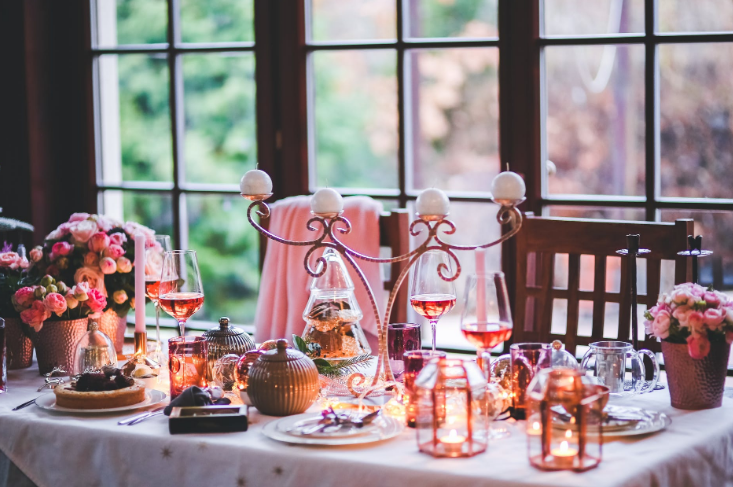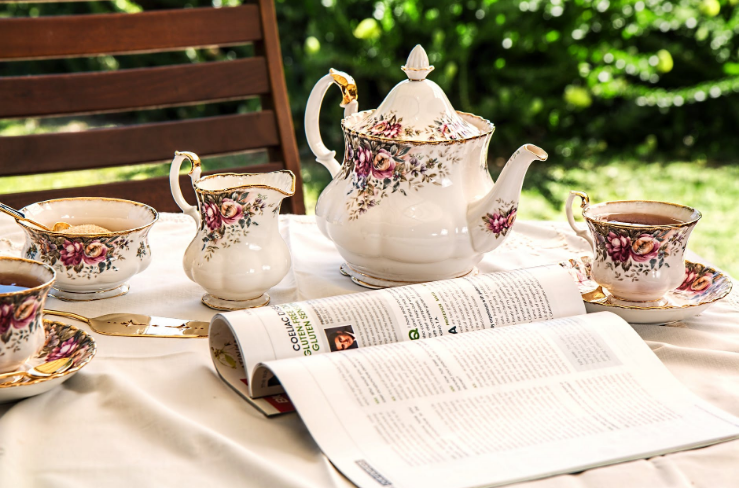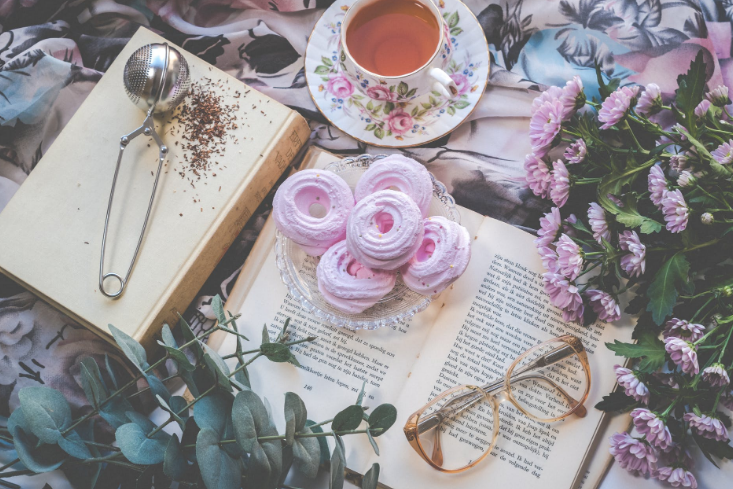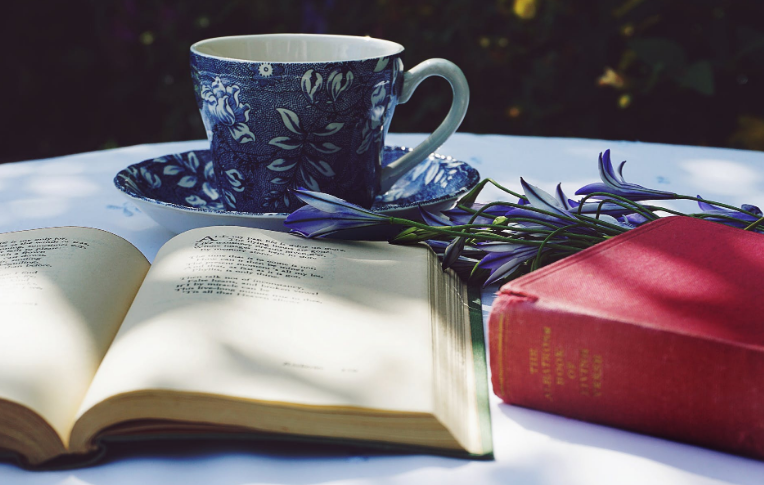August 2019
 Having tea with Mrs. Dalloway is always interesting. One never quite knows these days what mood she’ll be in or what will come out of her mouth — if anything at all. Sometimes conversation lapses and she has that look of peering into the distance at something pleasant that blots out all the inconveniences of the present. I don’t mind — it gives me a chance to reflect inwardly myself. Sometimes that’s better than talking. The words always start up again afterward.
Having tea with Mrs. Dalloway is always interesting. One never quite knows these days what mood she’ll be in or what will come out of her mouth — if anything at all. Sometimes conversation lapses and she has that look of peering into the distance at something pleasant that blots out all the inconveniences of the present. I don’t mind — it gives me a chance to reflect inwardly myself. Sometimes that’s better than talking. The words always start up again afterward.
I should say that Mrs. Dalloway and I are the most unlikely pair of interlocutors one could hope to see meet over tea. We have absolutely nothing in common. Had she lived my life she’d have looked continually as though she’d been pulled through a hedge backwards. Had I lived her life I’d most likely have found my name in the evening papers in very much the wrong sort of headline. So it should by right strike me as odd that our teatimes are so convivial and so productive with regard to discussion. I think their ease has to do with age, really. We’re both at a point in life where things of the wide world matter much less than they did earlier. I think it fair to say she’s even further down that alley than I am myself. Therein lies one of the reasons I don’t mind her flights into introspection during our time together — I know it’s like a fishing expedition and that she’ll return with something interesting on her line to plop down on the table for discussion. I can’t say that would have been as likely 20 years ago — for her, in any case. She’s made up for lost time in the matter of introspection.
I’ll admit I sometimes goad her into storytelling about the good old days on the estate for the sheer pleasure of putting myself in that scene. It makes an enormous difference to hear such things from a living person sitting across from you. Since anything of the sort is entirely outside my own experience I can only imagine it as something like a visit to a museum, since that world no longer exists. To hear her tell about living it brings it all alive and makes it immediate. It’s not just a record of a particular class at a particular time in history — a time of decline, in point of fact — it’s the memory of a living person who speaks from lived experience. The people aren’t archetypes, they have names and quirks and likes and dislikes just like everyone else. I imagine Mrs. Dalloway there as in the place where she most belongs. Like a plant that needs a particular soil and pattern of light to flourish, so Mrs. Dalloway at Bourton. When that look of peering into the distance comes over her I think she’s looking for herself, the self she remembers from that time and place. Things got much more complicated when that time came to an end. “Adulting” they call it now. I’ve always just called it “reality.”

Another reason our teatime goes along so swimmingly is the complete lack of pressure I bring to the occasion. Miss Kilman, of course, does precisely the opposite. I’ve never met the woman, only heard tell of her, but she sounds like one of those steam-roller types whose company after very short exposure begins to provoke an allergic reaction. Welts come up, you start coughing, something of that sort. I may be as different from Mrs. Dalloway as chalk is from cheese but there’s no pressure on her to accommodate me in the least. That’s the last thing in the world I’d want to see happen — accommodation. We’ve both done far too much of that over the course of our lifetimes, it’s high time to put an end to it at this late stage of the proceedings.
I find she talks less and less about people and more about her own thoughts. That may have to do with her recent illness — it does make one consider things sub speciae aeternitatis, especially when a major organ is involved. It could also come with the phase of life we’re in now — “… Mrs. Dalloway; not even Clarissa any more …” It’s been long years since she was just Clarissa. That’s who she peers into the past to see, I think — Clarissa. The young woman who opened the French doors of a morning, looked out at the garden and thought, “What a lark! What a plunge!” There’s no plunging when it comes to being Mrs. Dalloway, that would never do for the wife of a Tory politician. Whatever would Lady Bruton say to that notion? One shudders to think. She’s caustic enough as it is dealing with Mrs. Dalloway, to confront her with Clarissa would likely provoke serious military manoeuvres with the goal of removing an enemy target — or dispatching it to the wilds of Canada from whence it might never again darken the shores of Merry Old. How thoughtful of Lady Bruton to provide an incarnate example of the evils of empire. I daresay it costs her a good deal of the energy she lavishes on the welfare of the country.
Mrs. Dalloway talks relatively seldom about Peter Walsh. That may seem odd considering the major role he played in the life of the young Clarissa. I’ve never met the man but find him easy to slot into a category I’d never dream of mentioning to Mrs. Dalloway: “Talks Big, Can’t Deliver.” One encounters the type fairly frequently and it shows up in a whole host of environments. Men seem to slide into that pigeonhole with particular ease, it’s much less likely for women. I ascribe that to the fact that women always have more responsibility — usually tacit — for seeing to the business of life, for making sure that things go along their course with the fewest bumps and upsets of the cart. Peter Walsh is a bumbler. Mrs. Dalloway may harbor some fondness for him stemming from her days at Bourton, but I’d be shot of the fellow in no time. He’s a great time-waster, is our dear Peter. Arm’s length isn’t enough, the distance to keep should be greater — India, perhaps? That would fit the bill nicely.

Because I’m not part of Mrs. Dalloway’s memories I lead the conversation into pathways of thought that allow her to sidestep those paths she treads by dint of habit. I suspect that’s one of the reasons the invitations to tea keep coming — I’m neutral territory and encourage those things in her that her environment (and the people in it) discourage. Richard, for example, leaves her to dangle in her role of wife without digging beneath the surface to find the person he’s married to. He himself isn’t so much a person as a political function. I suppose such things are inevitable given the way we organize life. It strikes me rather like being married to one of the delivery men from Rumpelmayer’s only during those hours when he’s on duty. You never see him being just a person, he’s always on the clock as a function in the scheme of things. I can’t say the idea appeals. I suspect some of the wistfulness I notice on Mrs. Dalloway’s face when she talks of Richard has something to do with the difficulties such an arrangement leaves plopped squarely in her lap.
I’d also never reveal to Mrs. Dalloway how the Edwardian business of marriage reminds me of livestock breeding more than of Grand Romance. The main considerations are pedigree and money, of course. That reality, too, underlies the world of Clarissa, despite the human face her own experience puts on things. What a tiny little world it was, really. Think of the rules of access. With whom would one cross paths in such a world? Only those similar enough in pedigree and income to find admission through the French doors. No larks or plunges in that regard, either, unless you were a complete renegade like Lady Jane Digby and left Merry Old far behind you — forever. Such originals are few and far between, however, and Clarissa would be the first to admit that she hasn’t the mettle to follow in such shoes. She did well to recognize here own limitations because she’d have been miserable had she tried to exceed them. Her life is now very like her house: eminently respectable, well-to-do, comfortable, the envy of anyone lower in the social pecking order, and … slightly boring. Aye, there’s the rub. That particular facet is another reason I’m asked to tea, I expect. I stir up pots with my stories about places Mrs. Dalloway has never seen, in some cases has never even heard about. The vicarious experience she has from my stories no doubt exceeds in attractiveness the original experience itself.
Perhaps it was my stories that led her talk about Septimus. It’s not a pleasant topic of conversation, to be sure, but that applies to much of life’s experiences, does it not? It doesn’t stop it from being real. I’ve not constrained my stories of other places and peoples merely to the pleasant things. Oh no, not a bit of it. At our age Mrs. Dalloway and I both need to face reality whatever it brings our way. Recounting to her my experiences has, I think, encouraged her to speak openly of things that she formerly kept to her own consideration and counsel. It’s inconceivable that she should bring up such matters with Richard, for example. Were she to suggest a course of action to her Tory husband, would it be any worse than Lady Bruton’s idea to ship unemployed Britons to Canada with government subsidy? I think not. But of course Mrs. Dalloway would never think of proposing anything, regardless what her thoughts on the matter might be. It’s not the done thing for a Mrs., is it.

I once asked Mrs. Dalloway if she could project herself into her present life from the Clarissa she was at Bourton. Perhaps it’s not a fair question given the vicissitudes of life in the real world and the pressures that come from outside rather than from within. All the same, it’s time to think of such things in our phase of life. I’ve asked myself such questions from my youth — Fate having given me that particular wrinkle of consciousness. I put forth the question to Mrs. Dalloway simply as a point of curiousity, not as a challenge. She hesitated after I asked so I quickly added the latter point to put her at ease. There followed one of those periods of gazing into the distance — reasonable enough after fielding such a question. Her response surprised me. She told me that when she was Clarissa at Bourton she didn’t think about anything as an individual, only as someone trying to find her way forward into what she thought was the personhood she was meant to have.
How refreshing an admission of the facts of the matter. I then asked her if there was anything after the course of her adult lifetime left of the Clarissa who had set herself that task. This time she took only a moment to answer. She said Clarissa never really changed, only the outward circumstances of life had changed, in ways she had in part predicted and in part could not have foreseen. Fair enough. I don’t think Mrs. Dalloway ascribed particularly great powers of insight to Clarissa who rather haphazardly considered her future as a young woman at Bourton. On the basis of my awareness of her that seems a reasonable assessment. I left the topic at that and moved to the next one: her party.
I’ve never been a fan of parties myself so I was interested to find out what she enjoys so about them. Some might think that they’re nothing more than her contribution to Richard’s political career. That would likely come out of Lady Bruton’s mouth. In that case they’d simply be part of the career agenda to which she became subservient as soon as the ring slipped on her finger. But surely, I thought to myself, given the spark of native enthusiasm she evinces when it comes time to throw her annual party, there must be something more to it beyond the utilitarian aspect. I decided to do a bit of exploring to see what I could see. So I asked her to describe the previous year’s party in some detail.

Well, it appears last year’s party had a few bumps along the road. Ellie Henderson was there, of course, she’s like furniture at such things, isn’t she. She really should carry a pocket notebook with a golf pencil attached by a ribbon so she can write important points down to relate later to Edith in case memory fails. After all, she’s getting older just like the rest of us. The rest of the cast wasn’t much different, only there was no Prime Minister last year, it seems, which by right should have livened things up, I’d have thought. But no, apparently persons of high rank lend energy to the proceedings by channelling the energy of the other guests into subterranean streams that erupt in huddles of people clustering to whisper to each other. With that useful pressure absent the channels meandered more than one might have wished.
Mrs. Dalloway herself is not the best hostess, truth be told. She’s incapable of taking the reins in her hands and moving the beast in the direction of her own choosing. From her recounting I gather that she operates like a chemist. She gets everything set up properly — flowers, drinks, food, etc. — then waits for the chemical reaction of the party to happen by itself. If the formula is a bit off and no effervescence arises she doesn’t intervene to correct the formula, she wrings her hands and hopes things come right. Sometimes they do, sometimes they don’t. If they don’t, she’s miserable for days afterward.
Curiously enough it was that last point that confirmed for me what I’ve long suspected. The thought came to me during one of our teas when Mrs. Dalloway waxed particularly enthusiastic in her description of life at Bourton. There was a dinner — the dinner at which she met Richard, in point of fact — that seemed a high point, one of life’s peak experiences. Everything was organized to perfection. The flowers were lovely, albeit in a manner a bit unorthodox because Sally Seton had taken a hint from the Far East, decapitated them and floated the blossoms in bowls of water. Quite a handsome effect but enough to set some of the old folks into a grumble about the wayward ways of youth. The food was perfect, the company was lively, and despite making the serious gaffe of introducing Richard as “Mr. Wickham” until he finally corrected the mistake Clarissa felt perfectly at ease. The evening flowed and the mood of the guests rose on its updraft.

It’s exactly that mood, that atmosphere that Mrs. Dalloway always envisions for her parties. She wants the evening to flow and the general mood of the guests to lift on the wings of sociability, ease and pleasure. She remembers it so well now, at this age, because the past has become much more immediate to her than it was when she was buried in the to-do of being the person she was meant to be. Each time she peers into the distance with that look of seeking on her face, Clarissa comes a few steps closer out of the past into the present. The best possible thing that could happen is that Clarissa should find Mrs. Dalloway in her handsome London townhouse and bring her to the point that she stands at the door to the garden and thinks, “What a lark! What a plunge!” Clarissa knew the unadulterated impulse toward that outwardness, unimpeded by anything in the context she inhabited. It stood wide open like a French door leading to a garden. If Mrs. Dalloway could recapture that sense it would be the best possible thing in the world for her. It would transform the ossified relationship with Richard, make daughter Elizabeth see her mother in a completely different and more kindly light, and make of Mrs. Dalloway’s final years a fitting conclusion of the early ones.
So that’s what a party given by Mrs. Dalloway really is — bringing the past into the present. It’s not really Mrs. Dalloway giving the party at all, in the final accounting.
It’s been Clarissa all along.
